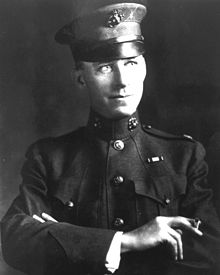Earl Hancock Ellis
Lieutenant Colonel Earl Hancock Pete Ellis was a United States Marine Corps Intelligence Officer, and author of Operations Plan 712 Advanced Base Operations in Micronesia , which became the basis for the American campaign of amphibious assault that defeated the Japanese in World War II. Ellis prophetic study helped establish his reputation at the forefront of naval theorists and strategist of the era in amphibious warfare, foreseeing the imminent attack from Japan leading to the islandhopping campaigns in the Central Pacific. Earl Ellis became the Marine Corps first spy, and his mysterious death became the subject of controversy.
Lieutenant Colonel Ellis was born on December 19, 1880 in Iuka, Kansas, a small farming community. His parents, Augustus and Catherine Axline Ellis, migrated from southeast Iowa to Kansas following the Homestead and Preemption Act. He was the second oldest sibling out of six surviving children, Ralph Ellis being born the oldest son Nellie Ellis who was the first born died of infantile cholera. He graduated first in his high school class at Pratt, Kansas. He was interested in baseball and was an avid reader, enjoyed Rudyard Kiplings stories and poems. His inspiration to enlist came from reading magazine and newspaper articles on the SpanishAmerican War. As a teenager, Ellis read of Robert W. Huntington commanding the First Marine Battalion , known as Huntingtons Battalion, the action at Cusco Well, and the Marine landing parties serving with Admiral George Dewey in the Philippines.
Source: Wikipedia

